Education Method & Self-Care Activities Among Diabetes Patients
VerifiedAdded on 2022/11/16
|18
|4861
|454
Report
AI Summary
This report investigates the correlation between education methods and self-care activities among newly diagnosed diabetes patients. It highlights the increasing global prevalence of diabetes and the crucial role of self-care in managing the disease and preventing complications. The study emphasizes the importance of patient education, self-efficacy, and adherence to treatment plans, including medication, blood glucose monitoring, diet, and physical activity. It also reviews the Diabetes Management Self-Efficacy Questionnaire (DMSES) as a tool for assessing self-care levels. The goal is to promote effective self-management education, improve the quality of life for individuals with diabetes, and reduce the risk of comorbid conditions. Desklib provides resources and study tools for students and researchers exploring healthcare topics.
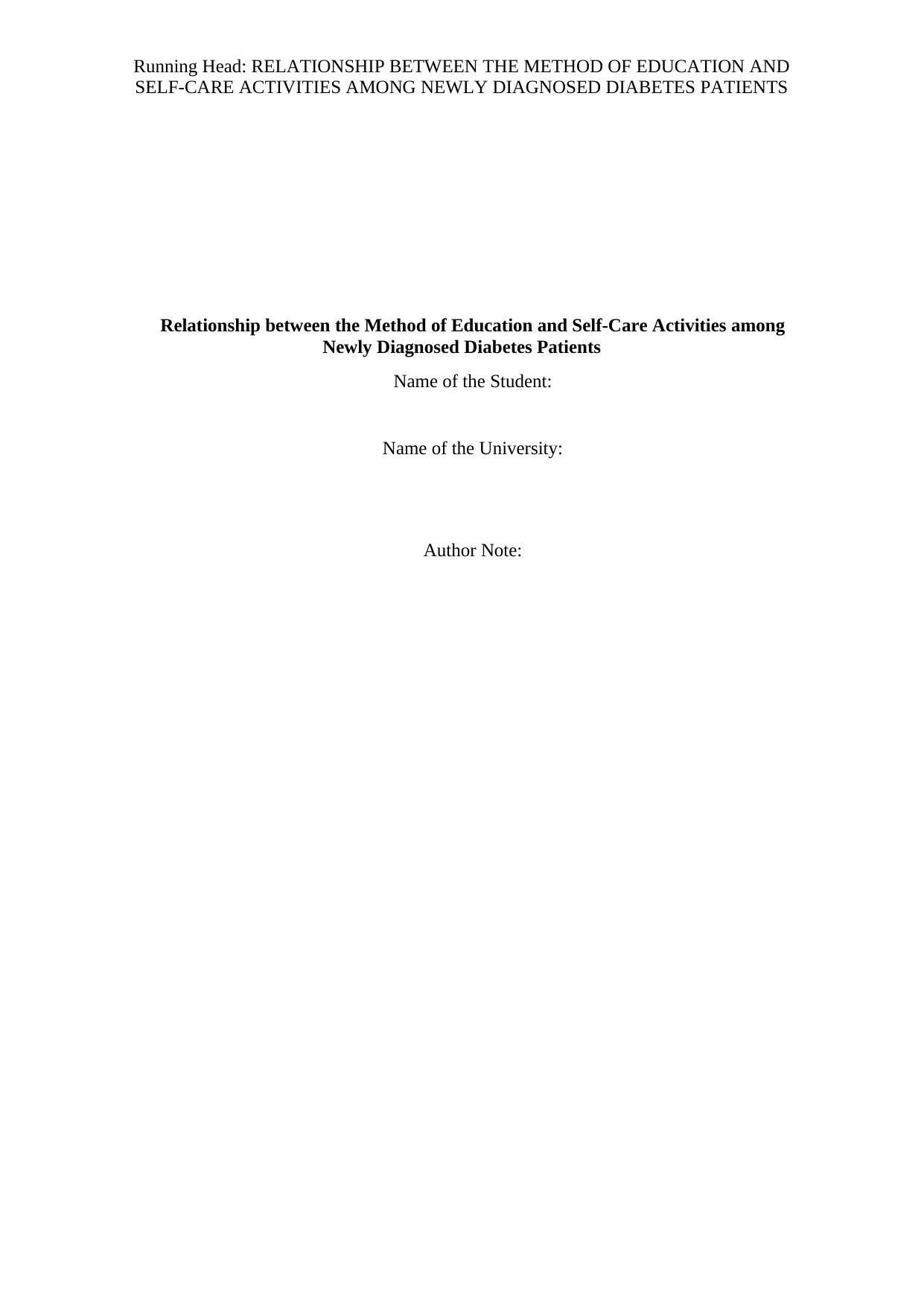
Running Head: RELATIONSHIP BETWEEN THE METHOD OF EDUCATION AND
SELF-CARE ACTIVITIES AMONG NEWLY DIAGNOSED DIABETES PATIENTS
Relationship between the Method of Education and Self-Care Activities among
Newly Diagnosed Diabetes Patients
Name of the Student:
Name of the University:
Author Note:
SELF-CARE ACTIVITIES AMONG NEWLY DIAGNOSED DIABETES PATIENTS
Relationship between the Method of Education and Self-Care Activities among
Newly Diagnosed Diabetes Patients
Name of the Student:
Name of the University:
Author Note:
Paraphrase This Document
Need a fresh take? Get an instant paraphrase of this document with our AI Paraphraser
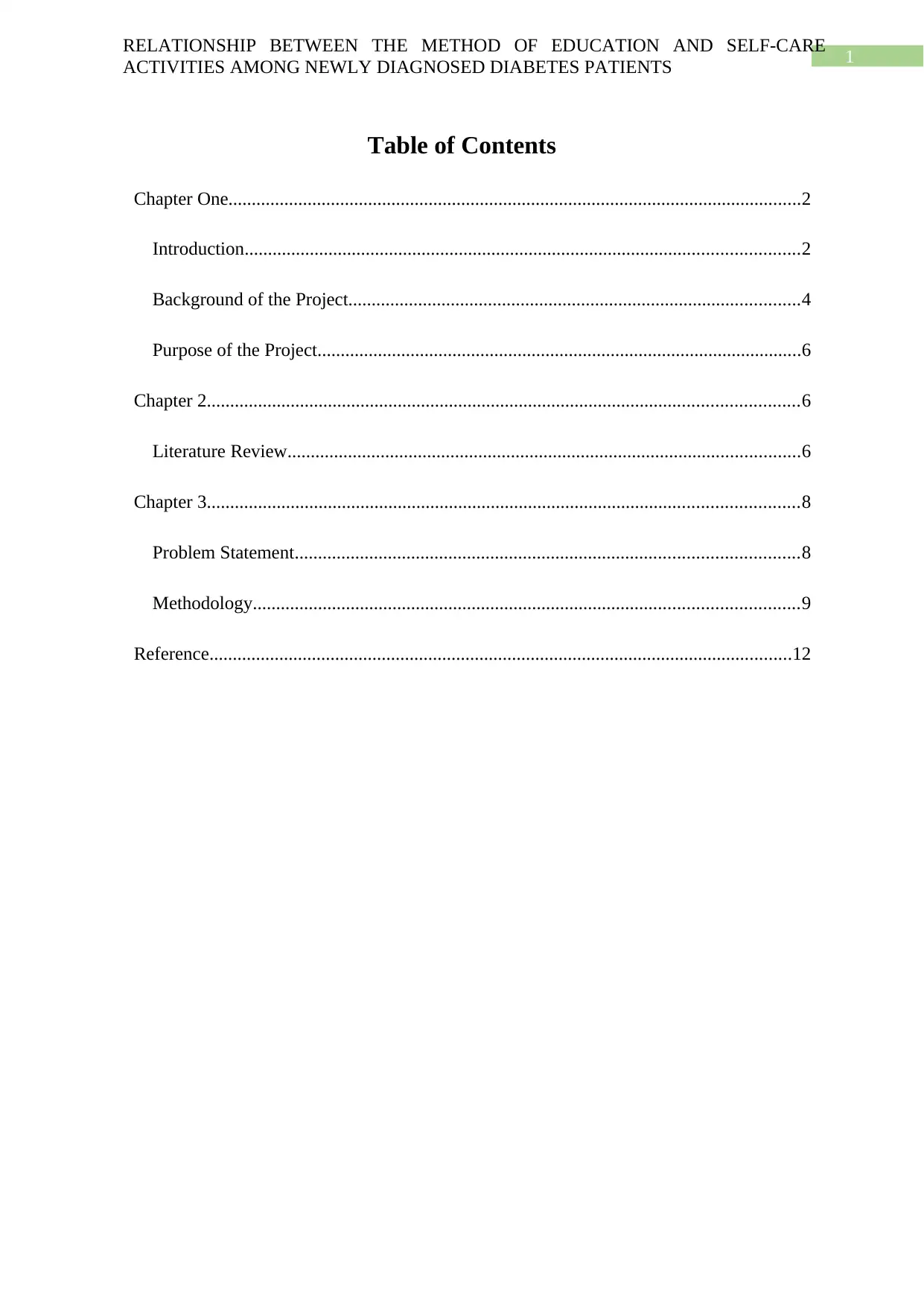
1
RELATIONSHIP BETWEEN THE METHOD OF EDUCATION AND SELF-CARE
ACTIVITIES AMONG NEWLY DIAGNOSED DIABETES PATIENTS
Table of Contents
Chapter One...........................................................................................................................2
Introduction.......................................................................................................................2
Background of the Project.................................................................................................4
Purpose of the Project........................................................................................................6
Chapter 2...............................................................................................................................6
Literature Review..............................................................................................................6
Chapter 3...............................................................................................................................8
Problem Statement............................................................................................................8
Methodology.....................................................................................................................9
Reference.............................................................................................................................12
RELATIONSHIP BETWEEN THE METHOD OF EDUCATION AND SELF-CARE
ACTIVITIES AMONG NEWLY DIAGNOSED DIABETES PATIENTS
Table of Contents
Chapter One...........................................................................................................................2
Introduction.......................................................................................................................2
Background of the Project.................................................................................................4
Purpose of the Project........................................................................................................6
Chapter 2...............................................................................................................................6
Literature Review..............................................................................................................6
Chapter 3...............................................................................................................................8
Problem Statement............................................................................................................8
Methodology.....................................................................................................................9
Reference.............................................................................................................................12
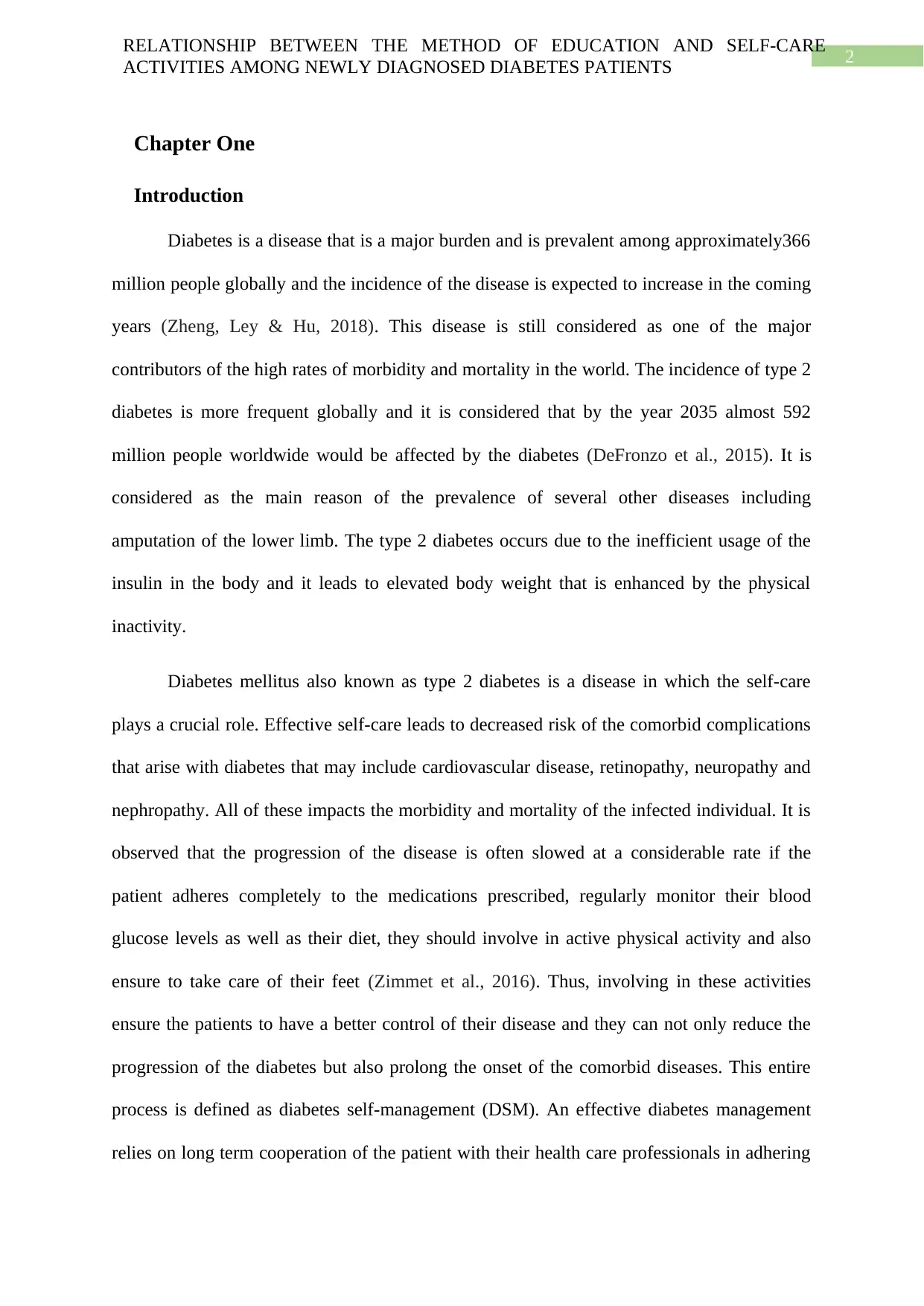
2
RELATIONSHIP BETWEEN THE METHOD OF EDUCATION AND SELF-CARE
ACTIVITIES AMONG NEWLY DIAGNOSED DIABETES PATIENTS
Chapter One
Introduction
Diabetes is a disease that is a major burden and is prevalent among approximately366
million people globally and the incidence of the disease is expected to increase in the coming
years (Zheng, Ley & Hu, 2018). This disease is still considered as one of the major
contributors of the high rates of morbidity and mortality in the world. The incidence of type 2
diabetes is more frequent globally and it is considered that by the year 2035 almost 592
million people worldwide would be affected by the diabetes (DeFronzo et al., 2015). It is
considered as the main reason of the prevalence of several other diseases including
amputation of the lower limb. The type 2 diabetes occurs due to the inefficient usage of the
insulin in the body and it leads to elevated body weight that is enhanced by the physical
inactivity.
Diabetes mellitus also known as type 2 diabetes is a disease in which the self-care
plays a crucial role. Effective self-care leads to decreased risk of the comorbid complications
that arise with diabetes that may include cardiovascular disease, retinopathy, neuropathy and
nephropathy. All of these impacts the morbidity and mortality of the infected individual. It is
observed that the progression of the disease is often slowed at a considerable rate if the
patient adheres completely to the medications prescribed, regularly monitor their blood
glucose levels as well as their diet, they should involve in active physical activity and also
ensure to take care of their feet (Zimmet et al., 2016). Thus, involving in these activities
ensure the patients to have a better control of their disease and they can not only reduce the
progression of the diabetes but also prolong the onset of the comorbid diseases. This entire
process is defined as diabetes self-management (DSM). An effective diabetes management
relies on long term cooperation of the patient with their health care professionals in adhering
RELATIONSHIP BETWEEN THE METHOD OF EDUCATION AND SELF-CARE
ACTIVITIES AMONG NEWLY DIAGNOSED DIABETES PATIENTS
Chapter One
Introduction
Diabetes is a disease that is a major burden and is prevalent among approximately366
million people globally and the incidence of the disease is expected to increase in the coming
years (Zheng, Ley & Hu, 2018). This disease is still considered as one of the major
contributors of the high rates of morbidity and mortality in the world. The incidence of type 2
diabetes is more frequent globally and it is considered that by the year 2035 almost 592
million people worldwide would be affected by the diabetes (DeFronzo et al., 2015). It is
considered as the main reason of the prevalence of several other diseases including
amputation of the lower limb. The type 2 diabetes occurs due to the inefficient usage of the
insulin in the body and it leads to elevated body weight that is enhanced by the physical
inactivity.
Diabetes mellitus also known as type 2 diabetes is a disease in which the self-care
plays a crucial role. Effective self-care leads to decreased risk of the comorbid complications
that arise with diabetes that may include cardiovascular disease, retinopathy, neuropathy and
nephropathy. All of these impacts the morbidity and mortality of the infected individual. It is
observed that the progression of the disease is often slowed at a considerable rate if the
patient adheres completely to the medications prescribed, regularly monitor their blood
glucose levels as well as their diet, they should involve in active physical activity and also
ensure to take care of their feet (Zimmet et al., 2016). Thus, involving in these activities
ensure the patients to have a better control of their disease and they can not only reduce the
progression of the diabetes but also prolong the onset of the comorbid diseases. This entire
process is defined as diabetes self-management (DSM). An effective diabetes management
relies on long term cooperation of the patient with their health care professionals in adhering
⊘ This is a preview!⊘
Do you want full access?
Subscribe today to unlock all pages.

Trusted by 1+ million students worldwide
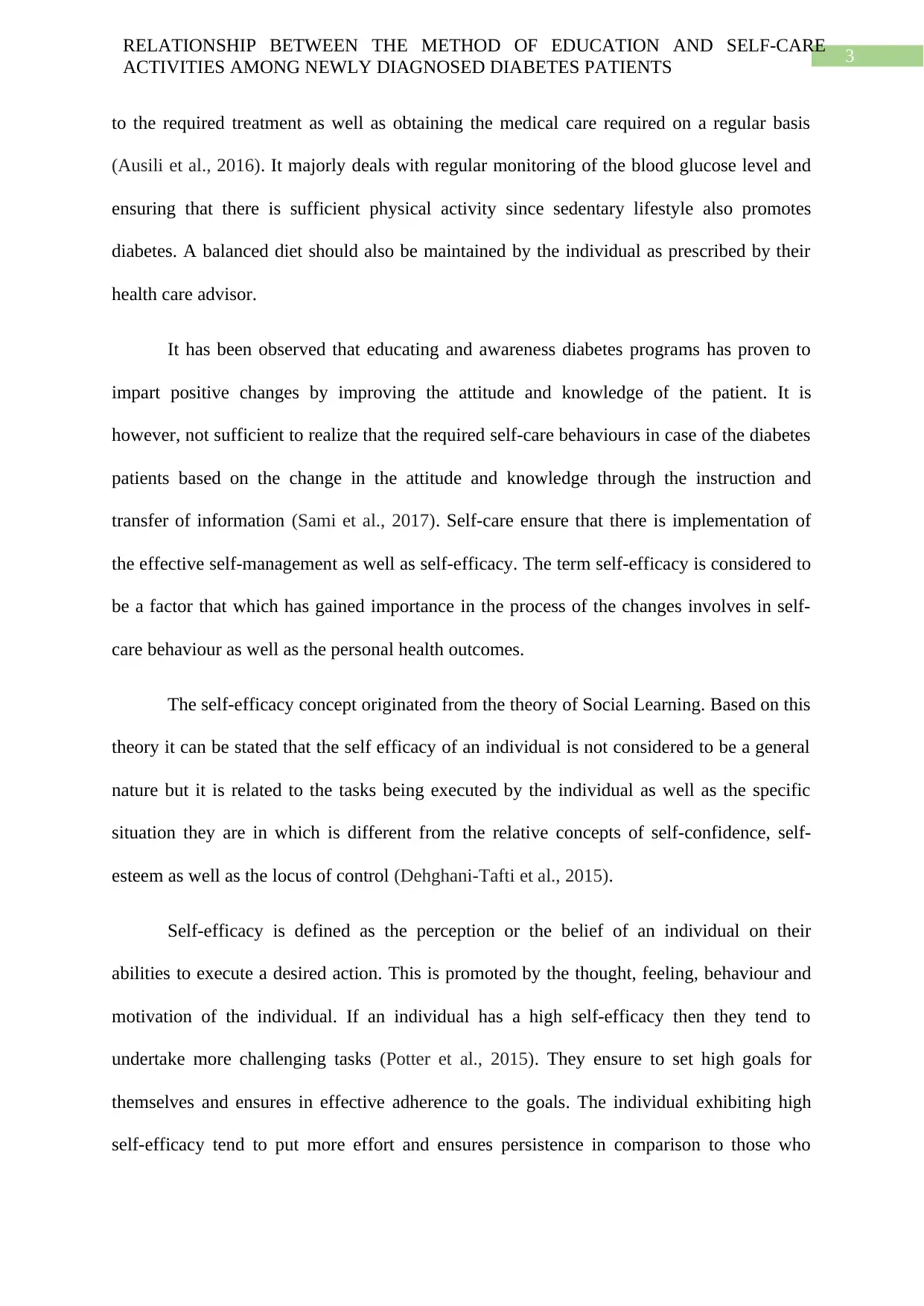
3
RELATIONSHIP BETWEEN THE METHOD OF EDUCATION AND SELF-CARE
ACTIVITIES AMONG NEWLY DIAGNOSED DIABETES PATIENTS
to the required treatment as well as obtaining the medical care required on a regular basis
(Ausili et al., 2016). It majorly deals with regular monitoring of the blood glucose level and
ensuring that there is sufficient physical activity since sedentary lifestyle also promotes
diabetes. A balanced diet should also be maintained by the individual as prescribed by their
health care advisor.
It has been observed that educating and awareness diabetes programs has proven to
impart positive changes by improving the attitude and knowledge of the patient. It is
however, not sufficient to realize that the required self-care behaviours in case of the diabetes
patients based on the change in the attitude and knowledge through the instruction and
transfer of information (Sami et al., 2017). Self-care ensure that there is implementation of
the effective self-management as well as self-efficacy. The term self-efficacy is considered to
be a factor that which has gained importance in the process of the changes involves in self-
care behaviour as well as the personal health outcomes.
The self-efficacy concept originated from the theory of Social Learning. Based on this
theory it can be stated that the self efficacy of an individual is not considered to be a general
nature but it is related to the tasks being executed by the individual as well as the specific
situation they are in which is different from the relative concepts of self-confidence, self-
esteem as well as the locus of control (Dehghani-Tafti et al., 2015).
Self-efficacy is defined as the perception or the belief of an individual on their
abilities to execute a desired action. This is promoted by the thought, feeling, behaviour and
motivation of the individual. If an individual has a high self-efficacy then they tend to
undertake more challenging tasks (Potter et al., 2015). They ensure to set high goals for
themselves and ensures in effective adherence to the goals. The individual exhibiting high
self-efficacy tend to put more effort and ensures persistence in comparison to those who
RELATIONSHIP BETWEEN THE METHOD OF EDUCATION AND SELF-CARE
ACTIVITIES AMONG NEWLY DIAGNOSED DIABETES PATIENTS
to the required treatment as well as obtaining the medical care required on a regular basis
(Ausili et al., 2016). It majorly deals with regular monitoring of the blood glucose level and
ensuring that there is sufficient physical activity since sedentary lifestyle also promotes
diabetes. A balanced diet should also be maintained by the individual as prescribed by their
health care advisor.
It has been observed that educating and awareness diabetes programs has proven to
impart positive changes by improving the attitude and knowledge of the patient. It is
however, not sufficient to realize that the required self-care behaviours in case of the diabetes
patients based on the change in the attitude and knowledge through the instruction and
transfer of information (Sami et al., 2017). Self-care ensure that there is implementation of
the effective self-management as well as self-efficacy. The term self-efficacy is considered to
be a factor that which has gained importance in the process of the changes involves in self-
care behaviour as well as the personal health outcomes.
The self-efficacy concept originated from the theory of Social Learning. Based on this
theory it can be stated that the self efficacy of an individual is not considered to be a general
nature but it is related to the tasks being executed by the individual as well as the specific
situation they are in which is different from the relative concepts of self-confidence, self-
esteem as well as the locus of control (Dehghani-Tafti et al., 2015).
Self-efficacy is defined as the perception or the belief of an individual on their
abilities to execute a desired action. This is promoted by the thought, feeling, behaviour and
motivation of the individual. If an individual has a high self-efficacy then they tend to
undertake more challenging tasks (Potter et al., 2015). They ensure to set high goals for
themselves and ensures in effective adherence to the goals. The individual exhibiting high
self-efficacy tend to put more effort and ensures persistence in comparison to those who
Paraphrase This Document
Need a fresh take? Get an instant paraphrase of this document with our AI Paraphraser
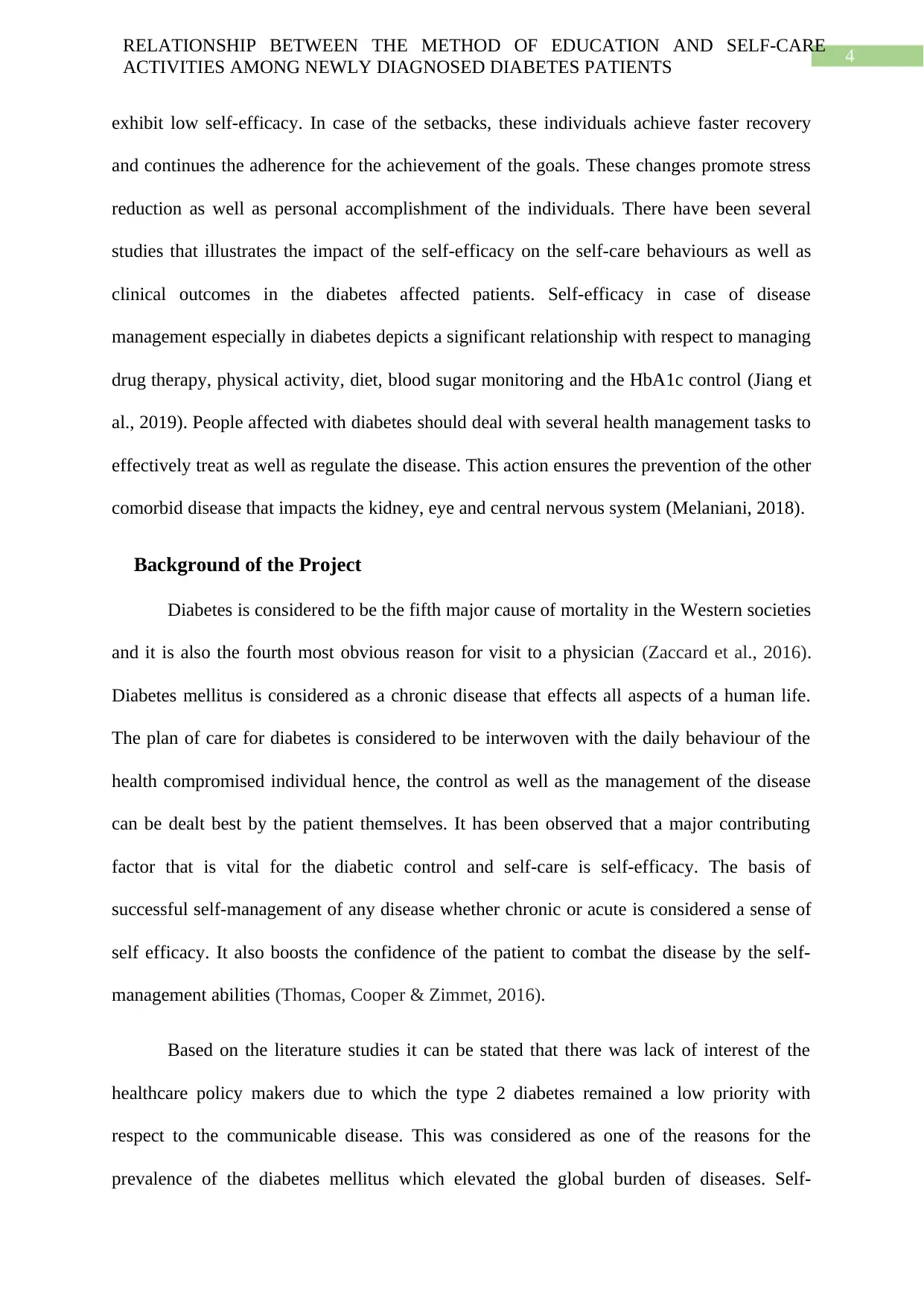
4
RELATIONSHIP BETWEEN THE METHOD OF EDUCATION AND SELF-CARE
ACTIVITIES AMONG NEWLY DIAGNOSED DIABETES PATIENTS
exhibit low self-efficacy. In case of the setbacks, these individuals achieve faster recovery
and continues the adherence for the achievement of the goals. These changes promote stress
reduction as well as personal accomplishment of the individuals. There have been several
studies that illustrates the impact of the self-efficacy on the self-care behaviours as well as
clinical outcomes in the diabetes affected patients. Self-efficacy in case of disease
management especially in diabetes depicts a significant relationship with respect to managing
drug therapy, physical activity, diet, blood sugar monitoring and the HbA1c control (Jiang et
al., 2019). People affected with diabetes should deal with several health management tasks to
effectively treat as well as regulate the disease. This action ensures the prevention of the other
comorbid disease that impacts the kidney, eye and central nervous system (Melaniani, 2018).
Background of the Project
Diabetes is considered to be the fifth major cause of mortality in the Western societies
and it is also the fourth most obvious reason for visit to a physician (Zaccard et al., 2016).
Diabetes mellitus is considered as a chronic disease that effects all aspects of a human life.
The plan of care for diabetes is considered to be interwoven with the daily behaviour of the
health compromised individual hence, the control as well as the management of the disease
can be dealt best by the patient themselves. It has been observed that a major contributing
factor that is vital for the diabetic control and self-care is self-efficacy. The basis of
successful self-management of any disease whether chronic or acute is considered a sense of
self efficacy. It also boosts the confidence of the patient to combat the disease by the self-
management abilities (Thomas, Cooper & Zimmet, 2016).
Based on the literature studies it can be stated that there was lack of interest of the
healthcare policy makers due to which the type 2 diabetes remained a low priority with
respect to the communicable disease. This was considered as one of the reasons for the
prevalence of the diabetes mellitus which elevated the global burden of diseases. Self-
RELATIONSHIP BETWEEN THE METHOD OF EDUCATION AND SELF-CARE
ACTIVITIES AMONG NEWLY DIAGNOSED DIABETES PATIENTS
exhibit low self-efficacy. In case of the setbacks, these individuals achieve faster recovery
and continues the adherence for the achievement of the goals. These changes promote stress
reduction as well as personal accomplishment of the individuals. There have been several
studies that illustrates the impact of the self-efficacy on the self-care behaviours as well as
clinical outcomes in the diabetes affected patients. Self-efficacy in case of disease
management especially in diabetes depicts a significant relationship with respect to managing
drug therapy, physical activity, diet, blood sugar monitoring and the HbA1c control (Jiang et
al., 2019). People affected with diabetes should deal with several health management tasks to
effectively treat as well as regulate the disease. This action ensures the prevention of the other
comorbid disease that impacts the kidney, eye and central nervous system (Melaniani, 2018).
Background of the Project
Diabetes is considered to be the fifth major cause of mortality in the Western societies
and it is also the fourth most obvious reason for visit to a physician (Zaccard et al., 2016).
Diabetes mellitus is considered as a chronic disease that effects all aspects of a human life.
The plan of care for diabetes is considered to be interwoven with the daily behaviour of the
health compromised individual hence, the control as well as the management of the disease
can be dealt best by the patient themselves. It has been observed that a major contributing
factor that is vital for the diabetic control and self-care is self-efficacy. The basis of
successful self-management of any disease whether chronic or acute is considered a sense of
self efficacy. It also boosts the confidence of the patient to combat the disease by the self-
management abilities (Thomas, Cooper & Zimmet, 2016).
Based on the literature studies it can be stated that there was lack of interest of the
healthcare policy makers due to which the type 2 diabetes remained a low priority with
respect to the communicable disease. This was considered as one of the reasons for the
prevalence of the diabetes mellitus which elevated the global burden of diseases. Self-
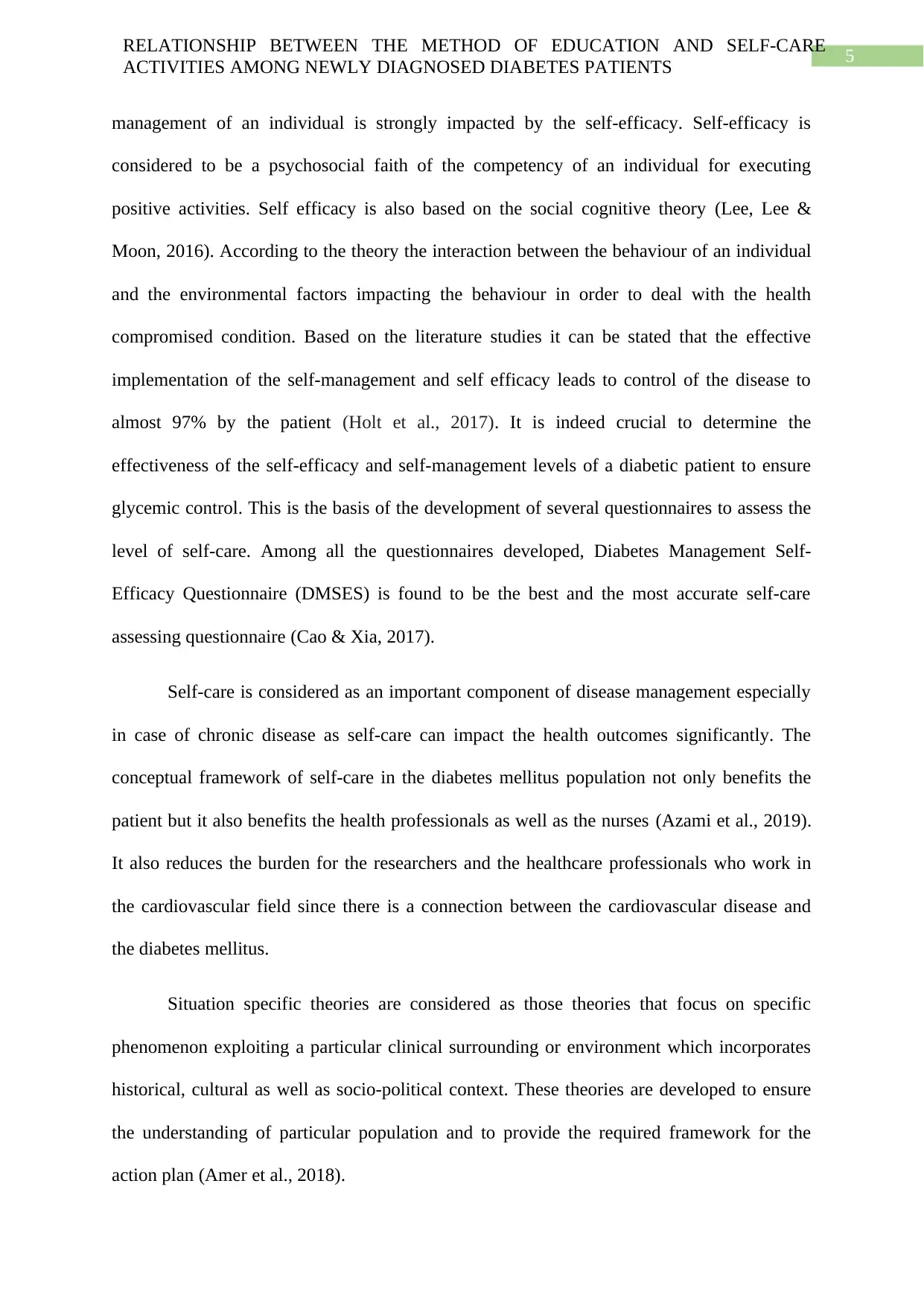
5
RELATIONSHIP BETWEEN THE METHOD OF EDUCATION AND SELF-CARE
ACTIVITIES AMONG NEWLY DIAGNOSED DIABETES PATIENTS
management of an individual is strongly impacted by the self-efficacy. Self-efficacy is
considered to be a psychosocial faith of the competency of an individual for executing
positive activities. Self efficacy is also based on the social cognitive theory (Lee, Lee &
Moon, 2016). According to the theory the interaction between the behaviour of an individual
and the environmental factors impacting the behaviour in order to deal with the health
compromised condition. Based on the literature studies it can be stated that the effective
implementation of the self-management and self efficacy leads to control of the disease to
almost 97% by the patient (Holt et al., 2017). It is indeed crucial to determine the
effectiveness of the self-efficacy and self-management levels of a diabetic patient to ensure
glycemic control. This is the basis of the development of several questionnaires to assess the
level of self-care. Among all the questionnaires developed, Diabetes Management Self-
Efficacy Questionnaire (DMSES) is found to be the best and the most accurate self-care
assessing questionnaire (Cao & Xia, 2017).
Self-care is considered as an important component of disease management especially
in case of chronic disease as self-care can impact the health outcomes significantly. The
conceptual framework of self-care in the diabetes mellitus population not only benefits the
patient but it also benefits the health professionals as well as the nurses (Azami et al., 2019).
It also reduces the burden for the researchers and the healthcare professionals who work in
the cardiovascular field since there is a connection between the cardiovascular disease and
the diabetes mellitus.
Situation specific theories are considered as those theories that focus on specific
phenomenon exploiting a particular clinical surrounding or environment which incorporates
historical, cultural as well as socio-political context. These theories are developed to ensure
the understanding of particular population and to provide the required framework for the
action plan (Amer et al., 2018).
RELATIONSHIP BETWEEN THE METHOD OF EDUCATION AND SELF-CARE
ACTIVITIES AMONG NEWLY DIAGNOSED DIABETES PATIENTS
management of an individual is strongly impacted by the self-efficacy. Self-efficacy is
considered to be a psychosocial faith of the competency of an individual for executing
positive activities. Self efficacy is also based on the social cognitive theory (Lee, Lee &
Moon, 2016). According to the theory the interaction between the behaviour of an individual
and the environmental factors impacting the behaviour in order to deal with the health
compromised condition. Based on the literature studies it can be stated that the effective
implementation of the self-management and self efficacy leads to control of the disease to
almost 97% by the patient (Holt et al., 2017). It is indeed crucial to determine the
effectiveness of the self-efficacy and self-management levels of a diabetic patient to ensure
glycemic control. This is the basis of the development of several questionnaires to assess the
level of self-care. Among all the questionnaires developed, Diabetes Management Self-
Efficacy Questionnaire (DMSES) is found to be the best and the most accurate self-care
assessing questionnaire (Cao & Xia, 2017).
Self-care is considered as an important component of disease management especially
in case of chronic disease as self-care can impact the health outcomes significantly. The
conceptual framework of self-care in the diabetes mellitus population not only benefits the
patient but it also benefits the health professionals as well as the nurses (Azami et al., 2019).
It also reduces the burden for the researchers and the healthcare professionals who work in
the cardiovascular field since there is a connection between the cardiovascular disease and
the diabetes mellitus.
Situation specific theories are considered as those theories that focus on specific
phenomenon exploiting a particular clinical surrounding or environment which incorporates
historical, cultural as well as socio-political context. These theories are developed to ensure
the understanding of particular population and to provide the required framework for the
action plan (Amer et al., 2018).
⊘ This is a preview!⊘
Do you want full access?
Subscribe today to unlock all pages.

Trusted by 1+ million students worldwide
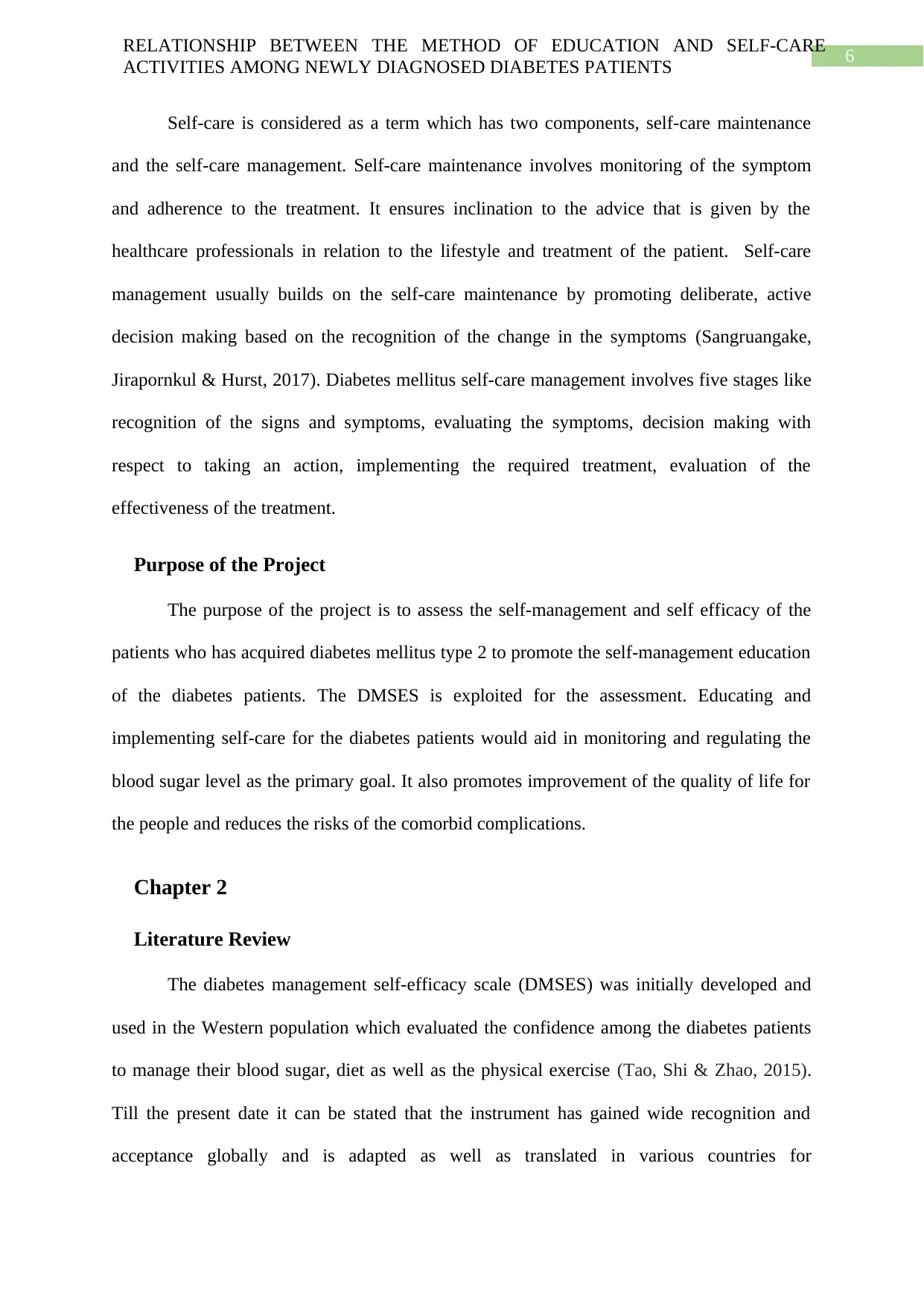
6
RELATIONSHIP BETWEEN THE METHOD OF EDUCATION AND SELF-CARE
ACTIVITIES AMONG NEWLY DIAGNOSED DIABETES PATIENTS
Self-care is considered as a term which has two components, self-care maintenance
and the self-care management. Self-care maintenance involves monitoring of the symptom
and adherence to the treatment. It ensures inclination to the advice that is given by the
healthcare professionals in relation to the lifestyle and treatment of the patient. Self-care
management usually builds on the self-care maintenance by promoting deliberate, active
decision making based on the recognition of the change in the symptoms (Sangruangake,
Jirapornkul & Hurst, 2017). Diabetes mellitus self-care management involves five stages like
recognition of the signs and symptoms, evaluating the symptoms, decision making with
respect to taking an action, implementing the required treatment, evaluation of the
effectiveness of the treatment.
Purpose of the Project
The purpose of the project is to assess the self-management and self efficacy of the
patients who has acquired diabetes mellitus type 2 to promote the self-management education
of the diabetes patients. The DMSES is exploited for the assessment. Educating and
implementing self-care for the diabetes patients would aid in monitoring and regulating the
blood sugar level as the primary goal. It also promotes improvement of the quality of life for
the people and reduces the risks of the comorbid complications.
Chapter 2
Literature Review
The diabetes management self-efficacy scale (DMSES) was initially developed and
used in the Western population which evaluated the confidence among the diabetes patients
to manage their blood sugar, diet as well as the physical exercise (Tao, Shi & Zhao, 2015).
Till the present date it can be stated that the instrument has gained wide recognition and
acceptance globally and is adapted as well as translated in various countries for
RELATIONSHIP BETWEEN THE METHOD OF EDUCATION AND SELF-CARE
ACTIVITIES AMONG NEWLY DIAGNOSED DIABETES PATIENTS
Self-care is considered as a term which has two components, self-care maintenance
and the self-care management. Self-care maintenance involves monitoring of the symptom
and adherence to the treatment. It ensures inclination to the advice that is given by the
healthcare professionals in relation to the lifestyle and treatment of the patient. Self-care
management usually builds on the self-care maintenance by promoting deliberate, active
decision making based on the recognition of the change in the symptoms (Sangruangake,
Jirapornkul & Hurst, 2017). Diabetes mellitus self-care management involves five stages like
recognition of the signs and symptoms, evaluating the symptoms, decision making with
respect to taking an action, implementing the required treatment, evaluation of the
effectiveness of the treatment.
Purpose of the Project
The purpose of the project is to assess the self-management and self efficacy of the
patients who has acquired diabetes mellitus type 2 to promote the self-management education
of the diabetes patients. The DMSES is exploited for the assessment. Educating and
implementing self-care for the diabetes patients would aid in monitoring and regulating the
blood sugar level as the primary goal. It also promotes improvement of the quality of life for
the people and reduces the risks of the comorbid complications.
Chapter 2
Literature Review
The diabetes management self-efficacy scale (DMSES) was initially developed and
used in the Western population which evaluated the confidence among the diabetes patients
to manage their blood sugar, diet as well as the physical exercise (Tao, Shi & Zhao, 2015).
Till the present date it can be stated that the instrument has gained wide recognition and
acceptance globally and is adapted as well as translated in various countries for
Paraphrase This Document
Need a fresh take? Get an instant paraphrase of this document with our AI Paraphraser
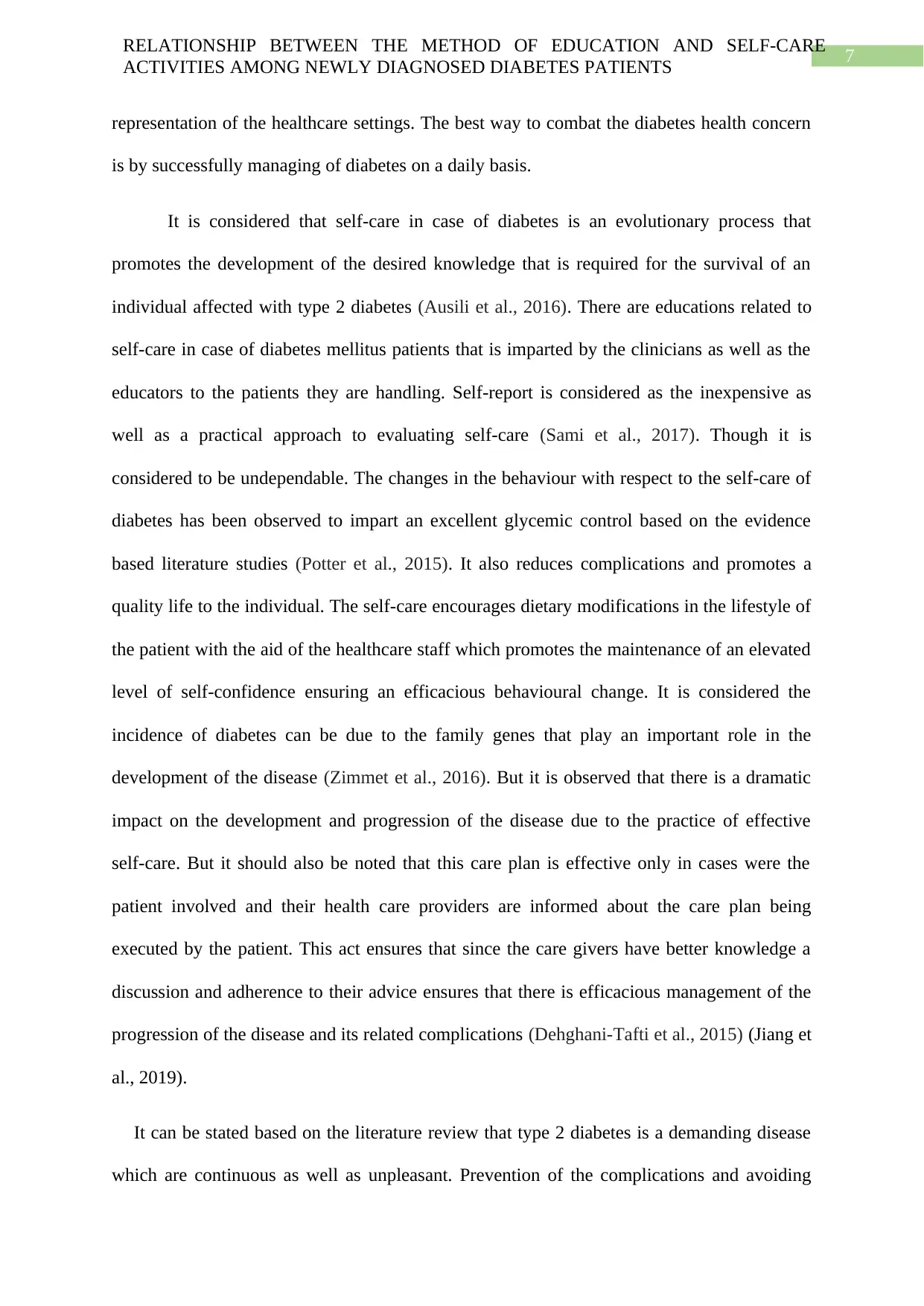
7
RELATIONSHIP BETWEEN THE METHOD OF EDUCATION AND SELF-CARE
ACTIVITIES AMONG NEWLY DIAGNOSED DIABETES PATIENTS
representation of the healthcare settings. The best way to combat the diabetes health concern
is by successfully managing of diabetes on a daily basis.
It is considered that self-care in case of diabetes is an evolutionary process that
promotes the development of the desired knowledge that is required for the survival of an
individual affected with type 2 diabetes (Ausili et al., 2016). There are educations related to
self-care in case of diabetes mellitus patients that is imparted by the clinicians as well as the
educators to the patients they are handling. Self-report is considered as the inexpensive as
well as a practical approach to evaluating self-care (Sami et al., 2017). Though it is
considered to be undependable. The changes in the behaviour with respect to the self-care of
diabetes has been observed to impart an excellent glycemic control based on the evidence
based literature studies (Potter et al., 2015). It also reduces complications and promotes a
quality life to the individual. The self-care encourages dietary modifications in the lifestyle of
the patient with the aid of the healthcare staff which promotes the maintenance of an elevated
level of self-confidence ensuring an efficacious behavioural change. It is considered the
incidence of diabetes can be due to the family genes that play an important role in the
development of the disease (Zimmet et al., 2016). But it is observed that there is a dramatic
impact on the development and progression of the disease due to the practice of effective
self-care. But it should also be noted that this care plan is effective only in cases were the
patient involved and their health care providers are informed about the care plan being
executed by the patient. This act ensures that since the care givers have better knowledge a
discussion and adherence to their advice ensures that there is efficacious management of the
progression of the disease and its related complications (Dehghani-Tafti et al., 2015) (Jiang et
al., 2019).
It can be stated based on the literature review that type 2 diabetes is a demanding disease
which are continuous as well as unpleasant. Prevention of the complications and avoiding
RELATIONSHIP BETWEEN THE METHOD OF EDUCATION AND SELF-CARE
ACTIVITIES AMONG NEWLY DIAGNOSED DIABETES PATIENTS
representation of the healthcare settings. The best way to combat the diabetes health concern
is by successfully managing of diabetes on a daily basis.
It is considered that self-care in case of diabetes is an evolutionary process that
promotes the development of the desired knowledge that is required for the survival of an
individual affected with type 2 diabetes (Ausili et al., 2016). There are educations related to
self-care in case of diabetes mellitus patients that is imparted by the clinicians as well as the
educators to the patients they are handling. Self-report is considered as the inexpensive as
well as a practical approach to evaluating self-care (Sami et al., 2017). Though it is
considered to be undependable. The changes in the behaviour with respect to the self-care of
diabetes has been observed to impart an excellent glycemic control based on the evidence
based literature studies (Potter et al., 2015). It also reduces complications and promotes a
quality life to the individual. The self-care encourages dietary modifications in the lifestyle of
the patient with the aid of the healthcare staff which promotes the maintenance of an elevated
level of self-confidence ensuring an efficacious behavioural change. It is considered the
incidence of diabetes can be due to the family genes that play an important role in the
development of the disease (Zimmet et al., 2016). But it is observed that there is a dramatic
impact on the development and progression of the disease due to the practice of effective
self-care. But it should also be noted that this care plan is effective only in cases were the
patient involved and their health care providers are informed about the care plan being
executed by the patient. This act ensures that since the care givers have better knowledge a
discussion and adherence to their advice ensures that there is efficacious management of the
progression of the disease and its related complications (Dehghani-Tafti et al., 2015) (Jiang et
al., 2019).
It can be stated based on the literature review that type 2 diabetes is a demanding disease
which are continuous as well as unpleasant. Prevention of the complications and avoiding
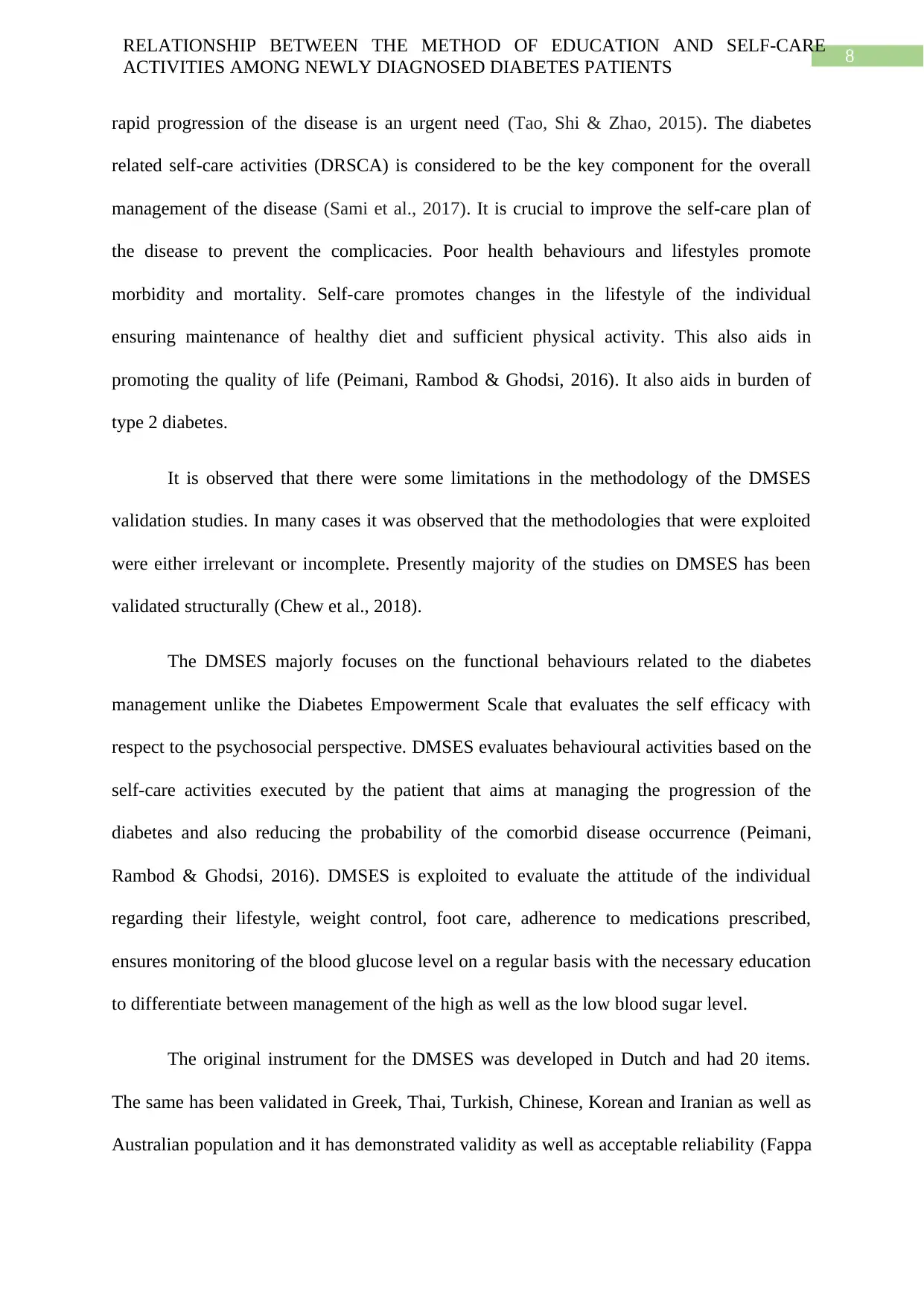
8
RELATIONSHIP BETWEEN THE METHOD OF EDUCATION AND SELF-CARE
ACTIVITIES AMONG NEWLY DIAGNOSED DIABETES PATIENTS
rapid progression of the disease is an urgent need (Tao, Shi & Zhao, 2015). The diabetes
related self-care activities (DRSCA) is considered to be the key component for the overall
management of the disease (Sami et al., 2017). It is crucial to improve the self-care plan of
the disease to prevent the complicacies. Poor health behaviours and lifestyles promote
morbidity and mortality. Self-care promotes changes in the lifestyle of the individual
ensuring maintenance of healthy diet and sufficient physical activity. This also aids in
promoting the quality of life (Peimani, Rambod & Ghodsi, 2016). It also aids in burden of
type 2 diabetes.
It is observed that there were some limitations in the methodology of the DMSES
validation studies. In many cases it was observed that the methodologies that were exploited
were either irrelevant or incomplete. Presently majority of the studies on DMSES has been
validated structurally (Chew et al., 2018).
The DMSES majorly focuses on the functional behaviours related to the diabetes
management unlike the Diabetes Empowerment Scale that evaluates the self efficacy with
respect to the psychosocial perspective. DMSES evaluates behavioural activities based on the
self-care activities executed by the patient that aims at managing the progression of the
diabetes and also reducing the probability of the comorbid disease occurrence (Peimani,
Rambod & Ghodsi, 2016). DMSES is exploited to evaluate the attitude of the individual
regarding their lifestyle, weight control, foot care, adherence to medications prescribed,
ensures monitoring of the blood glucose level on a regular basis with the necessary education
to differentiate between management of the high as well as the low blood sugar level.
The original instrument for the DMSES was developed in Dutch and had 20 items.
The same has been validated in Greek, Thai, Turkish, Chinese, Korean and Iranian as well as
Australian population and it has demonstrated validity as well as acceptable reliability (Fappa
RELATIONSHIP BETWEEN THE METHOD OF EDUCATION AND SELF-CARE
ACTIVITIES AMONG NEWLY DIAGNOSED DIABETES PATIENTS
rapid progression of the disease is an urgent need (Tao, Shi & Zhao, 2015). The diabetes
related self-care activities (DRSCA) is considered to be the key component for the overall
management of the disease (Sami et al., 2017). It is crucial to improve the self-care plan of
the disease to prevent the complicacies. Poor health behaviours and lifestyles promote
morbidity and mortality. Self-care promotes changes in the lifestyle of the individual
ensuring maintenance of healthy diet and sufficient physical activity. This also aids in
promoting the quality of life (Peimani, Rambod & Ghodsi, 2016). It also aids in burden of
type 2 diabetes.
It is observed that there were some limitations in the methodology of the DMSES
validation studies. In many cases it was observed that the methodologies that were exploited
were either irrelevant or incomplete. Presently majority of the studies on DMSES has been
validated structurally (Chew et al., 2018).
The DMSES majorly focuses on the functional behaviours related to the diabetes
management unlike the Diabetes Empowerment Scale that evaluates the self efficacy with
respect to the psychosocial perspective. DMSES evaluates behavioural activities based on the
self-care activities executed by the patient that aims at managing the progression of the
diabetes and also reducing the probability of the comorbid disease occurrence (Peimani,
Rambod & Ghodsi, 2016). DMSES is exploited to evaluate the attitude of the individual
regarding their lifestyle, weight control, foot care, adherence to medications prescribed,
ensures monitoring of the blood glucose level on a regular basis with the necessary education
to differentiate between management of the high as well as the low blood sugar level.
The original instrument for the DMSES was developed in Dutch and had 20 items.
The same has been validated in Greek, Thai, Turkish, Chinese, Korean and Iranian as well as
Australian population and it has demonstrated validity as well as acceptable reliability (Fappa
⊘ This is a preview!⊘
Do you want full access?
Subscribe today to unlock all pages.

Trusted by 1+ million students worldwide
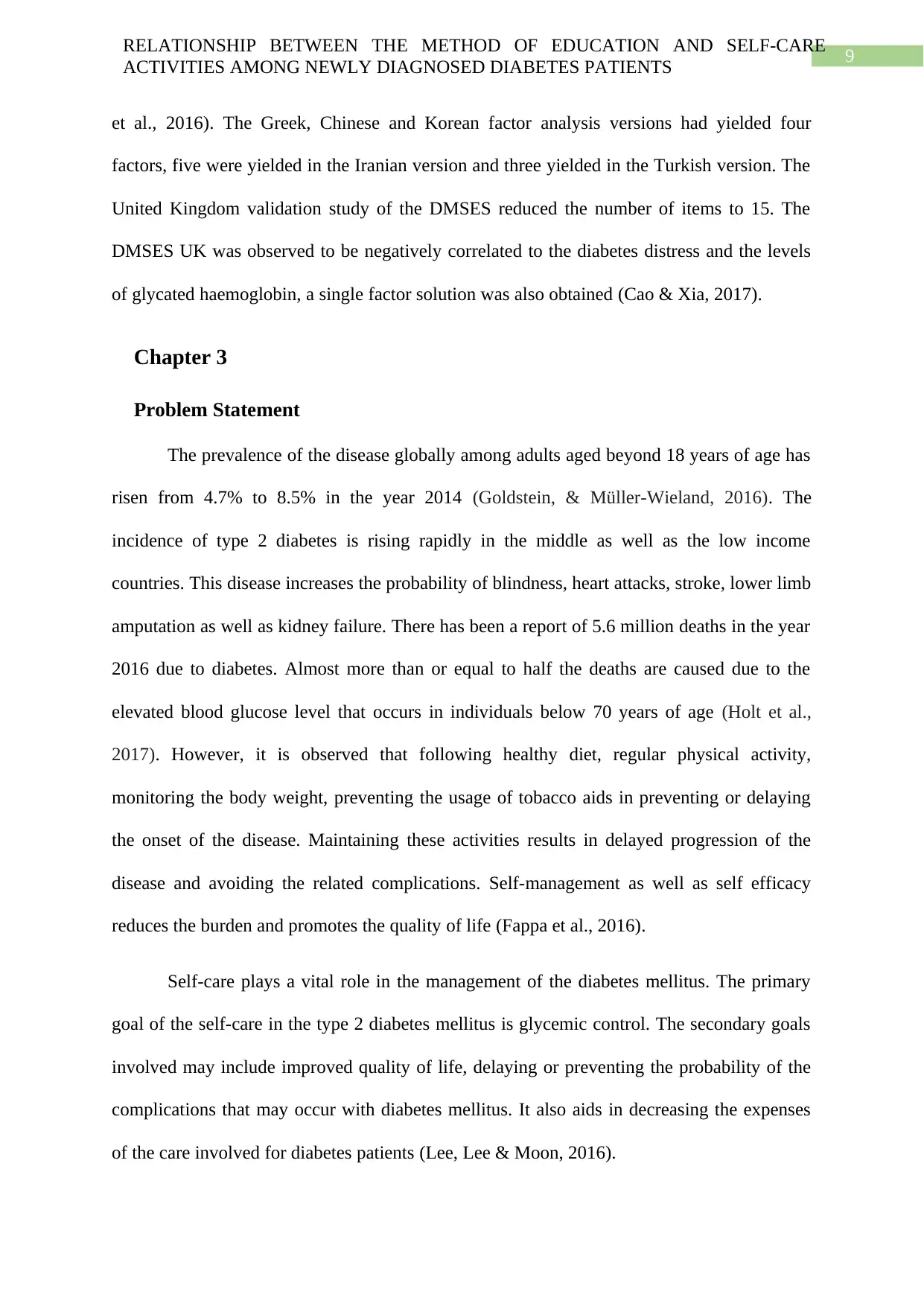
9
RELATIONSHIP BETWEEN THE METHOD OF EDUCATION AND SELF-CARE
ACTIVITIES AMONG NEWLY DIAGNOSED DIABETES PATIENTS
et al., 2016). The Greek, Chinese and Korean factor analysis versions had yielded four
factors, five were yielded in the Iranian version and three yielded in the Turkish version. The
United Kingdom validation study of the DMSES reduced the number of items to 15. The
DMSES UK was observed to be negatively correlated to the diabetes distress and the levels
of glycated haemoglobin, a single factor solution was also obtained (Cao & Xia, 2017).
Chapter 3
Problem Statement
The prevalence of the disease globally among adults aged beyond 18 years of age has
risen from 4.7% to 8.5% in the year 2014 (Goldstein, & Müller-Wieland, 2016). The
incidence of type 2 diabetes is rising rapidly in the middle as well as the low income
countries. This disease increases the probability of blindness, heart attacks, stroke, lower limb
amputation as well as kidney failure. There has been a report of 5.6 million deaths in the year
2016 due to diabetes. Almost more than or equal to half the deaths are caused due to the
elevated blood glucose level that occurs in individuals below 70 years of age (Holt et al.,
2017). However, it is observed that following healthy diet, regular physical activity,
monitoring the body weight, preventing the usage of tobacco aids in preventing or delaying
the onset of the disease. Maintaining these activities results in delayed progression of the
disease and avoiding the related complications. Self-management as well as self efficacy
reduces the burden and promotes the quality of life (Fappa et al., 2016).
Self-care plays a vital role in the management of the diabetes mellitus. The primary
goal of the self-care in the type 2 diabetes mellitus is glycemic control. The secondary goals
involved may include improved quality of life, delaying or preventing the probability of the
complications that may occur with diabetes mellitus. It also aids in decreasing the expenses
of the care involved for diabetes patients (Lee, Lee & Moon, 2016).
RELATIONSHIP BETWEEN THE METHOD OF EDUCATION AND SELF-CARE
ACTIVITIES AMONG NEWLY DIAGNOSED DIABETES PATIENTS
et al., 2016). The Greek, Chinese and Korean factor analysis versions had yielded four
factors, five were yielded in the Iranian version and three yielded in the Turkish version. The
United Kingdom validation study of the DMSES reduced the number of items to 15. The
DMSES UK was observed to be negatively correlated to the diabetes distress and the levels
of glycated haemoglobin, a single factor solution was also obtained (Cao & Xia, 2017).
Chapter 3
Problem Statement
The prevalence of the disease globally among adults aged beyond 18 years of age has
risen from 4.7% to 8.5% in the year 2014 (Goldstein, & Müller-Wieland, 2016). The
incidence of type 2 diabetes is rising rapidly in the middle as well as the low income
countries. This disease increases the probability of blindness, heart attacks, stroke, lower limb
amputation as well as kidney failure. There has been a report of 5.6 million deaths in the year
2016 due to diabetes. Almost more than or equal to half the deaths are caused due to the
elevated blood glucose level that occurs in individuals below 70 years of age (Holt et al.,
2017). However, it is observed that following healthy diet, regular physical activity,
monitoring the body weight, preventing the usage of tobacco aids in preventing or delaying
the onset of the disease. Maintaining these activities results in delayed progression of the
disease and avoiding the related complications. Self-management as well as self efficacy
reduces the burden and promotes the quality of life (Fappa et al., 2016).
Self-care plays a vital role in the management of the diabetes mellitus. The primary
goal of the self-care in the type 2 diabetes mellitus is glycemic control. The secondary goals
involved may include improved quality of life, delaying or preventing the probability of the
complications that may occur with diabetes mellitus. It also aids in decreasing the expenses
of the care involved for diabetes patients (Lee, Lee & Moon, 2016).
Paraphrase This Document
Need a fresh take? Get an instant paraphrase of this document with our AI Paraphraser
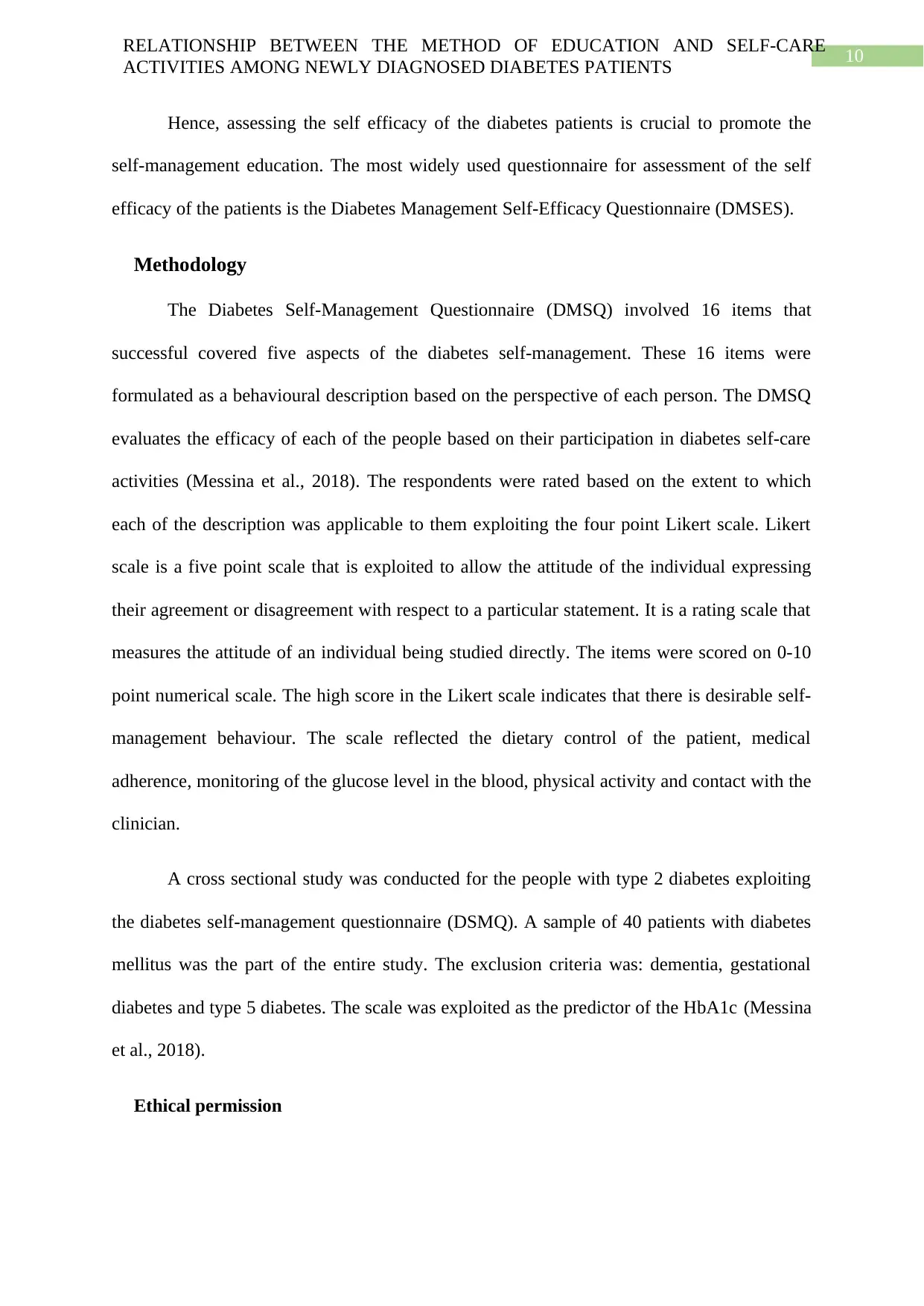
10
RELATIONSHIP BETWEEN THE METHOD OF EDUCATION AND SELF-CARE
ACTIVITIES AMONG NEWLY DIAGNOSED DIABETES PATIENTS
Hence, assessing the self efficacy of the diabetes patients is crucial to promote the
self-management education. The most widely used questionnaire for assessment of the self
efficacy of the patients is the Diabetes Management Self-Efficacy Questionnaire (DMSES).
Methodology
The Diabetes Self-Management Questionnaire (DMSQ) involved 16 items that
successful covered five aspects of the diabetes self-management. These 16 items were
formulated as a behavioural description based on the perspective of each person. The DMSQ
evaluates the efficacy of each of the people based on their participation in diabetes self-care
activities (Messina et al., 2018). The respondents were rated based on the extent to which
each of the description was applicable to them exploiting the four point Likert scale. Likert
scale is a five point scale that is exploited to allow the attitude of the individual expressing
their agreement or disagreement with respect to a particular statement. It is a rating scale that
measures the attitude of an individual being studied directly. The items were scored on 0-10
point numerical scale. The high score in the Likert scale indicates that there is desirable self-
management behaviour. The scale reflected the dietary control of the patient, medical
adherence, monitoring of the glucose level in the blood, physical activity and contact with the
clinician.
A cross sectional study was conducted for the people with type 2 diabetes exploiting
the diabetes self-management questionnaire (DSMQ). A sample of 40 patients with diabetes
mellitus was the part of the entire study. The exclusion criteria was: dementia, gestational
diabetes and type 5 diabetes. The scale was exploited as the predictor of the HbA1c (Messina
et al., 2018).
Ethical permission
RELATIONSHIP BETWEEN THE METHOD OF EDUCATION AND SELF-CARE
ACTIVITIES AMONG NEWLY DIAGNOSED DIABETES PATIENTS
Hence, assessing the self efficacy of the diabetes patients is crucial to promote the
self-management education. The most widely used questionnaire for assessment of the self
efficacy of the patients is the Diabetes Management Self-Efficacy Questionnaire (DMSES).
Methodology
The Diabetes Self-Management Questionnaire (DMSQ) involved 16 items that
successful covered five aspects of the diabetes self-management. These 16 items were
formulated as a behavioural description based on the perspective of each person. The DMSQ
evaluates the efficacy of each of the people based on their participation in diabetes self-care
activities (Messina et al., 2018). The respondents were rated based on the extent to which
each of the description was applicable to them exploiting the four point Likert scale. Likert
scale is a five point scale that is exploited to allow the attitude of the individual expressing
their agreement or disagreement with respect to a particular statement. It is a rating scale that
measures the attitude of an individual being studied directly. The items were scored on 0-10
point numerical scale. The high score in the Likert scale indicates that there is desirable self-
management behaviour. The scale reflected the dietary control of the patient, medical
adherence, monitoring of the glucose level in the blood, physical activity and contact with the
clinician.
A cross sectional study was conducted for the people with type 2 diabetes exploiting
the diabetes self-management questionnaire (DSMQ). A sample of 40 patients with diabetes
mellitus was the part of the entire study. The exclusion criteria was: dementia, gestational
diabetes and type 5 diabetes. The scale was exploited as the predictor of the HbA1c (Messina
et al., 2018).
Ethical permission
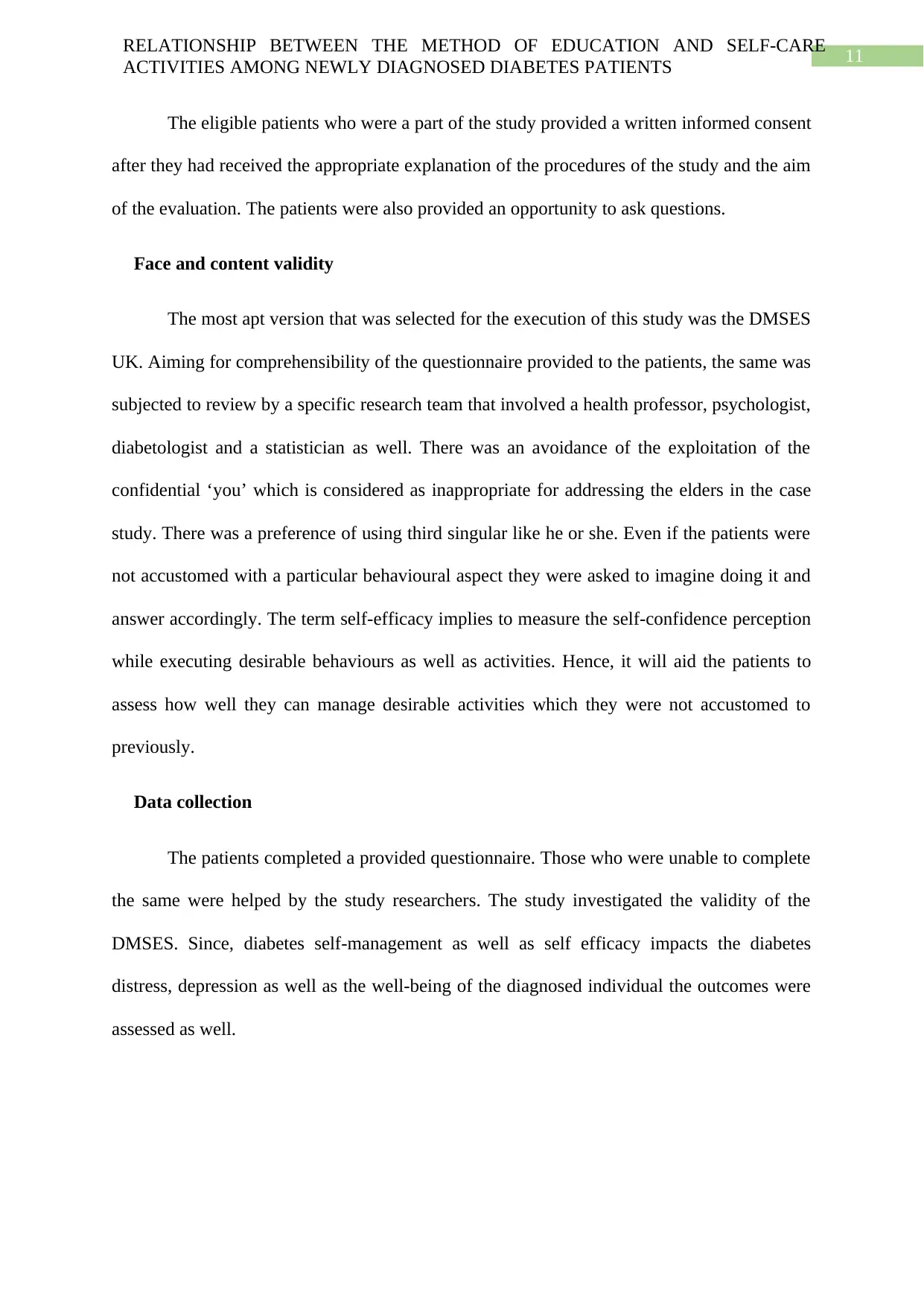
11
RELATIONSHIP BETWEEN THE METHOD OF EDUCATION AND SELF-CARE
ACTIVITIES AMONG NEWLY DIAGNOSED DIABETES PATIENTS
The eligible patients who were a part of the study provided a written informed consent
after they had received the appropriate explanation of the procedures of the study and the aim
of the evaluation. The patients were also provided an opportunity to ask questions.
Face and content validity
The most apt version that was selected for the execution of this study was the DMSES
UK. Aiming for comprehensibility of the questionnaire provided to the patients, the same was
subjected to review by a specific research team that involved a health professor, psychologist,
diabetologist and a statistician as well. There was an avoidance of the exploitation of the
confidential ‘you’ which is considered as inappropriate for addressing the elders in the case
study. There was a preference of using third singular like he or she. Even if the patients were
not accustomed with a particular behavioural aspect they were asked to imagine doing it and
answer accordingly. The term self-efficacy implies to measure the self-confidence perception
while executing desirable behaviours as well as activities. Hence, it will aid the patients to
assess how well they can manage desirable activities which they were not accustomed to
previously.
Data collection
The patients completed a provided questionnaire. Those who were unable to complete
the same were helped by the study researchers. The study investigated the validity of the
DMSES. Since, diabetes self-management as well as self efficacy impacts the diabetes
distress, depression as well as the well-being of the diagnosed individual the outcomes were
assessed as well.
RELATIONSHIP BETWEEN THE METHOD OF EDUCATION AND SELF-CARE
ACTIVITIES AMONG NEWLY DIAGNOSED DIABETES PATIENTS
The eligible patients who were a part of the study provided a written informed consent
after they had received the appropriate explanation of the procedures of the study and the aim
of the evaluation. The patients were also provided an opportunity to ask questions.
Face and content validity
The most apt version that was selected for the execution of this study was the DMSES
UK. Aiming for comprehensibility of the questionnaire provided to the patients, the same was
subjected to review by a specific research team that involved a health professor, psychologist,
diabetologist and a statistician as well. There was an avoidance of the exploitation of the
confidential ‘you’ which is considered as inappropriate for addressing the elders in the case
study. There was a preference of using third singular like he or she. Even if the patients were
not accustomed with a particular behavioural aspect they were asked to imagine doing it and
answer accordingly. The term self-efficacy implies to measure the self-confidence perception
while executing desirable behaviours as well as activities. Hence, it will aid the patients to
assess how well they can manage desirable activities which they were not accustomed to
previously.
Data collection
The patients completed a provided questionnaire. Those who were unable to complete
the same were helped by the study researchers. The study investigated the validity of the
DMSES. Since, diabetes self-management as well as self efficacy impacts the diabetes
distress, depression as well as the well-being of the diagnosed individual the outcomes were
assessed as well.
⊘ This is a preview!⊘
Do you want full access?
Subscribe today to unlock all pages.

Trusted by 1+ million students worldwide
1 out of 18
Related Documents
Your All-in-One AI-Powered Toolkit for Academic Success.
+13062052269
info@desklib.com
Available 24*7 on WhatsApp / Email
![[object Object]](/_next/static/media/star-bottom.7253800d.svg)
Unlock your academic potential
Copyright © 2020–2026 A2Z Services. All Rights Reserved. Developed and managed by ZUCOL.





